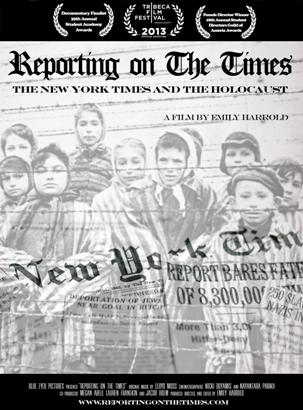“Sometime they’ll give a war and nobody will come.” The prophetic statement, made by a little girl watching soldiers marching down the street in Carl Sandburg’s prose poem The People, Yes (1936), is the probable origin of the 1960s anti-war slogan: What if they had a war and nobody came? While it may sound naive, a belief in the power of public opinion to shape government policy is supported by history. It makes sense: if enough people support something, it will happen. The problem is that it’s not merely a question of numbers.
Never in history have so many people had access to the means of production as we do today, with the ability to broadcast instantaneously worldwide. The question is: who’s listening? How, amid the flood of information, do we discern between valid and the preposterous, how do we know what is true?
In the good old days, we had objective, well-researched news reporting, backed up by meticulous fact-checking. Or did we? Reporting on the Times is an incisive short (18 min) film that provides insight on the decision making process of newspaper editors, revealing the vulnerabilities of that bastion of objective old-school journalism of the highest standards: The New York Times. Directed by Emily Harrold, the documentary examines the way The New York Times muted their coverage of the Holocaust. Based on Prof. Laurel Leff’s Buried by the Times, the film features interviews with Leff, former New York Times reporters Alex Jones and Ari Goldman, historian Henry Weingold, Warsaw Ghetto and Holocaust survivor Estelle Laughlin among others; as well as archival material. The thought-provoking film raises many questions on the power wielded by the media, the responsibility inherent in that power, and the different considerations that enter into editorial decision making.
The issues are complex. Taking the question at face value, few would deny that it is legitimate for a newspaper to consider its target audience in determining article choice and placement. Yet, when one learns that on July 29, 1942, The New York Times placed a story on the Warsaw Ghetto on page seven, stating: “Nazi authorities in Poland are planning to exterminate the entire Warsaw Ghetto population,” it gives one pause. The impact is intensified as this statement is read by Laughlin, who was ten years old when the war broke out. Had this been a headline article, would it have made a difference? Laughlin’s words remain with me: “We kept on hoping, if the world would only know.”
Reporting on the Times will be screened at the Jerusalem International Film Festival as part of The Jewish Experience program, in a joint screening with Joachim Prinz: I Shall Not Be Silent. The film, directed by Rachel Eskin Fisher and Rachel Nierenberg Pasternak, documents the life story of Berlin-born Joachim Prinz. A Rabbi of the Jewish community during Hitler’s regime, he immigrated to the United States in 1937, becoming an active and outspoken community leader and supporter of civil rights. President of the American Jewish Congress at the time, he was one of the organizers of the March on Washington on August 28, 1963. Taking his turn at the podium right after Mahalia Jackson and just before Martin Luther King Jr’s I Have a Dream speech, Prinz recalled his experiences as a rabbi in Nazi Germany, saying: “the most urgent, the most disgraceful, the most shameful and the most tragic problem is silence.”
Reporting on the Times (USA, 18 min, 2013, English)
Directed by Emily Harrold
Joachim Prinz: I Shall Not Be Silent (USA, 50 min, 2014, English)
Directed by Rachel Eskin Fisher, Rachel Nierenberg Pasternak
JFF screenings will take place on July 15th at 14:00 ; July 19th at 10:00. Tickets may be ordered via this link






